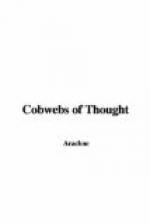Maeterlinck’s doctrine of the soul and its power over Destiny is very captivating, but it is doubtful if he was fortunate in his choice of Hamlet as an example of ignorance and blindness, and of failure to conquer fate, through lack of soul-power.
How Hamlet should have acted is not told us, but that it was his duty to have given up revenge is clearly suggested. We might, perhaps, sum up Hamlet’s right course, from the hints Maeterlinck has given us, in a sentence. Had he relinquished all idea of revenge and forgiven his uncle and mother, he would have ennobled his soul, gained inward happiness, spread a gracious calm around and have so deeply influenced his wicked relations, that they would have become repentant and reformed. Thus his evil Destiny would have been averted and we should have had no tragedy of Hamlet. This explanation sounds rather conventional and tract-like put into ordinary language, but, indeed, Maeterlinck’s doctrine might be compressed into a syllogism:—
All the wise are serene,
Hamlet was not serene,
Hamlet was not wise.
That is the simple syllogism by which Maeterlinck tests human nature. But Hamlet’s nature cannot be packed into a syllogism. A Theorist, who tries to fit into his theory a peculiar nature cannot always afford to understand that nature. The external event that froze Hamlet’s soul with horror, and deprived it of “transforming power” was a supernatural event, not “disease, accident, or sudden death!” The mandate laid on his soul was a supernatural mandate, and as Judge Webb said in a suggestive and interesting paper:




